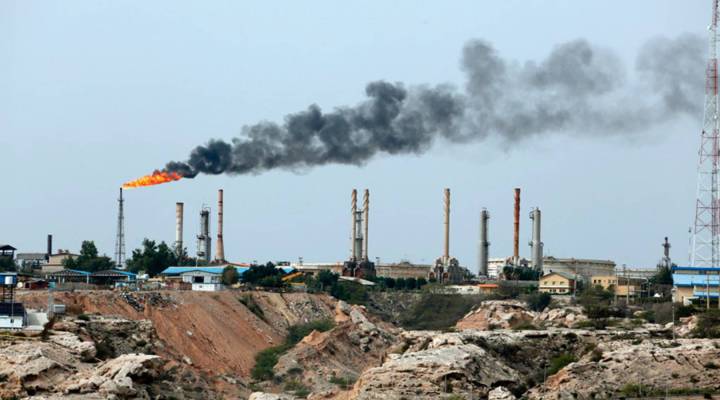
Can the U.S. stop all oil exports from Iran?

This week the Trump administration began re-imposing sanctions against Iran, and it seeks to reduce Iran’s exports of crude oil to zero by November. How successful that is could impact oil and gas prices around the world. In rural Virginia, residents are paying attention already.
At the farmers market in the town of Culpeper, about 70 miles from Washington, D.C., several merchants are cheering the American sanctions on Tehran.
“Iran is a country that scares me with what they are doing,” said Hannah Jackson, who has a booth at the farmers market and sells meals for delivery in the region. “Sanctions on them to let them know that we’re serious, you know, is something that we need to do.”
Keeping Iranian oil out of the world’s supply of crude could tighten the market and raise prices, something Jackson is watching carefully. She fills up her pickup twice a week.
“It’s about a 100 bucks a week,” Jackson said. “And then I have another car that I fill up at least once, and that’s around 40.”
Evan and Karen Boone, who sell beef at the farmers market, have similar driving habits. They drive a diesel pickup 80 miles round trip to a meat processor two or three times a week.
“You’re getting like 12 miles per gallon towing,” Evan said.
Still, he described sanctions as a good thing.
“I believe we should be supporting more American oil,” he said.
Iran exports about 2.5 million barrels of crude oil every day. The Trump administration has stated it seeks to choke that down to zero. In the past, though, oil has seeped through the cracks of sanctions imposed on Iran and Iraq.
This time around, two countries have already announced plans to keep buying Iranian crude: China and Turkey.
Here’s how China could pull it off: The sanctions identify banks around the world involved in Iranian oil sales. The United States insists any bank continuing to do those deals would be cut off from future international business. But that would not hurt Chinese banks that mostly do business inside China. They won’t be deterred.
“There is at least one bank that does seem to do that, the Bank of Kunlun,” said Ellen Wald, president of Transversal Consulting and author of “Saudi, Inc.: The Arabian Kingdom’s Pursuit of Profit and Power.” “That bank was active in the last, previous round of sanctions in financing purchases of Iranian oil.”
In the case of Turkey, it shares a border with Iran and the two countries could conduct discreet deals that also work around international banks.
“It is also possible for Iran to truck its oil across the border to Turkey,” Wald said. “And that would be much harder for the U.S. to track.”
And then there’s a type of oil export referred to in the trade as cheating.
“There are so many ways to cheat,” said Sara Vakhshouri, president of the energy consultancy SVB Energy International.
Iranian oil can be blended in with other liquid exports that are not sanctioned. The country’s tanker ships can turn off their geotransponders at sea. Or they can make secret hookups with other ships.
“So basically sell your oil to another ship on the sea,” Vakhshouri said. “It’s not very easy to track all the ships around the world and see for some hours two ships were connected through some pipe.”
Despite the workarounds, Vakhshouri expects Iranian exports to still fall by a good amount — perhaps from 2.5 million barrels per day to less than 1 million — because key buyers in Europe and Japan are already seeking alternate suppliers.
This would mean less total oil supply in the world. Analysts believe other producing countries, notably Saudi Arabia and Russia, could make up that shortfall. But in doing so, that would leave precious little “spare capacity” for emergencies, say a pipeline explosion or turmoil in Libya or Venezuela.
“That will have a significant impact on the psychology of the traders” Vakhshouri said. “And if the market at any time has any indication or scenario of interruption in the future, that would have an impact on the current price.”
The upshot: a heightened risk of higher oil and gas prices, which has drawn the attention of some at the farmers market in Culpeper, Virginia. Are they ready for volatility?
“That’s a good question,” said farmers market manager Tom Henneman. “Depends how high the price of gasoline would go. If it goes up 10 cents a gallon, then it’s worth it. If it goes up $2 and 50 cents a gallon, it may not be worth it.”
Any impact on gas prices could come at an interesting political moment. The oil sanctions on Iran take full effect Nov. 4, two days before the midterm elections.
There’s a lot happening in the world. Through it all, Marketplace is here for you.
You rely on Marketplace to break down the world’s events and tell you how it affects you in a fact-based, approachable way. We rely on your financial support to keep making that possible.
Your donation today powers the independent journalism that you rely on. For just $5/month, you can help sustain Marketplace so we can keep reporting on the things that matter to you.












